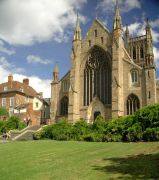
Thomas Tomkins (1572-1656)

 |
Thomas Tomkins (1572-1656) |
 |
Tomkins could be regarded as the last great English composer to come out of the golden period of musical creativity established during the Elizabethan era, as he outlived all his contemporaries, living until the middle of the 17th Century. Born in St. David's, Wales and a chorister in the Chapel Royal, he studied with William Byrd. At twenty four he became Organist at Worcester Cathedral (officially instructor choristarum), but his name first came to public attention when he contributed a madrigal to the 'The Triumphes of Oriana' of 1601 in honour of Queen Elizabeth's long reign. Tomkins was also knowledgeable in the building of organs and engaged Robert Dallam to build a fine instrument at Worcester. Appointed a Gentleman of the Chapel Royal in 1620 she also shared the organ playing with Orlando Gibbons. Longevity, however, did not breed security as during the time of his tenure at Worcester the Civil War broke out and Worcester being a major stronghold of the Royalist cause left the city open to attack by the parliamentarians; as a result the organ was dismantled and Tomkins made redundant. He was nevertheless able to live in the cathedral precincts until 1654 when he left to live with his son Nathaniel at Martin Hussingtree, where he died in 1656. He was buried on 9th June somewhere in the churchyard there, or so it is thought (his grave has never been located).
'In Nomine' 1 & 2 are part of '8 Nomines', presumably playable on either the virginals or the organ.